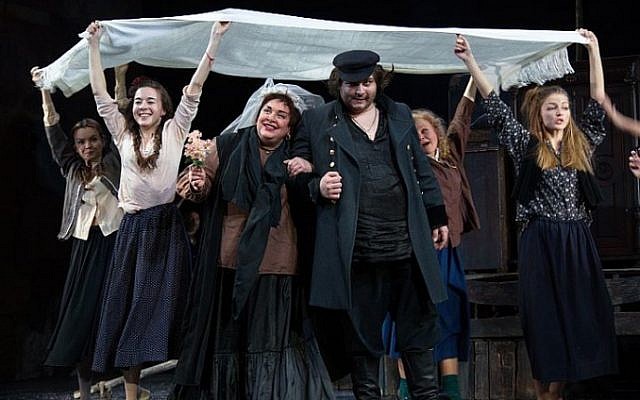Russian Drama Recalls Passover From Turbulent Time
A new Russian film recently shown at Emory University is a reminder that personal and communal survival was on the minds of those who celebrated the holiday

A new Russian film recently shown at Emory University is a reminder that personal and communal survival, as much as the Passover theme of freedom, was on the minds of those who celebrated the holiday under the brutal anti-Semitic rule of the Czars in the Russian empire of the 19th and early 20th centuries.
“Smile Upon Us, Lord” is a filmed play based on a production by Moscow’s famed Vakhtangov State Academic Theatre, which has had outstanding reviews of performances in London and New York.
It tells the story of how an elderly stonecutter, Efraim Dudak, and two of his friends, travel from their shtetl in rural Lithuania, then a Russian province, to the capital, Vilnius, to try to save his son from Czarist justice.
The dangerous trip, which is as much about the journey as it is the object of the journey, is undertaken when the old man learns that his son is to be tried for the attempted assassination of the Czar’s governor.
Over half of the Jews of the world lived in Russia at this time when Jewish life was particularly harsh. Pogroms were frequent events and the holiday of Passover often became as much about giving thanks for another year of life than a festival about divinely inspired freedom.
“Smile Upon Us, Lord” is set at about the same time as the infamous Kishinev massacre. In what is now the Republic of Moldova, that began on Easter Sunday in 1903, just a week before Passover.
In a rampage that made headlines in many newspapers of the time, 49 Jews were killed, 500 were injured, scores of Jewish women were raped by gangs armed with knives and hatchets, more than 1,500 Jewish homes were damaged, and 2,000 Jews were left homeless.

Three years ago, Steven J. Zipperstein, a prominent scholar of Jewish history at Emory University, delivered the Tenenbaum Lecture about the massacre and its importance during the last century.
The far-reaching consequences of the pogrom were said to have breathed new life into the young Zionist movement. In Palestine the massacre spurred on such Russian immigrants as David Ben-Gurion and others of his generation to create a network of settlements and kibbutzim where Jews would be able to defend themselves against attacks from the outside.
The pogrom inspired new waves of Jewish immigration to America and increased the radicalization of a new generation of Russian Jews.
One of those Jews who was then radicalized is the son of the stonecutter in “Smile Upon Us, Lord.”
The filmed stage play is based upon the work of the famed Jewish Lithuanian novelist, Grigory Kanovich, who explores the precarious nature of life then and now.
The director of the production, Rimas Tuminas, who is also Lithuanian and grew up with Jews, but is not Jewish, has been quoted as saying that the message of the play is a universal one.
“Now the world is dangerously balanced between war and peace. In the play, characters undertake a journey at a very unstable time. Their world is not unbalanced, it’s horrifying, and the characters feel both its rising madness and approaching calamity. A natural human intention to develop something useful is replaced by a sudden urge to destroy.”
But Tuminas has made a work that resonates with personal, human emotion too.
The drama is built on this line from the play that speaks to the separation that develops between parent and children as they age.
“Wherever we traverse, wherever we go,” Ephraim says during the play, “We are for our children. And our children are traversing and going further and further away from us.”
Still Ephraim and his companions travel the road to Vilnius in a horse-drawn wagon with its immense load of furniture, perhaps symbolic of the burdens from their past that they carry from the shtetl to the big city.
The film, which was produced by Stage Russia in Moscow, has been screened at a number of AMC and Regal theaters around the country. Owners have been exploring how to make their theaters, in a sense, cultural centers as well as venues for the latest superhero blockbusters.
Taking advantage of the flexibility of digital projection equipment and the networking inherent in web-based distribution, they are bringing some of the world’s greatest theatrical and musical performances to the nation’s movie theaters at affordable prices.
“Smile Upon Us, Lord” may yet smile upon us, again, in Atlanta.



comments